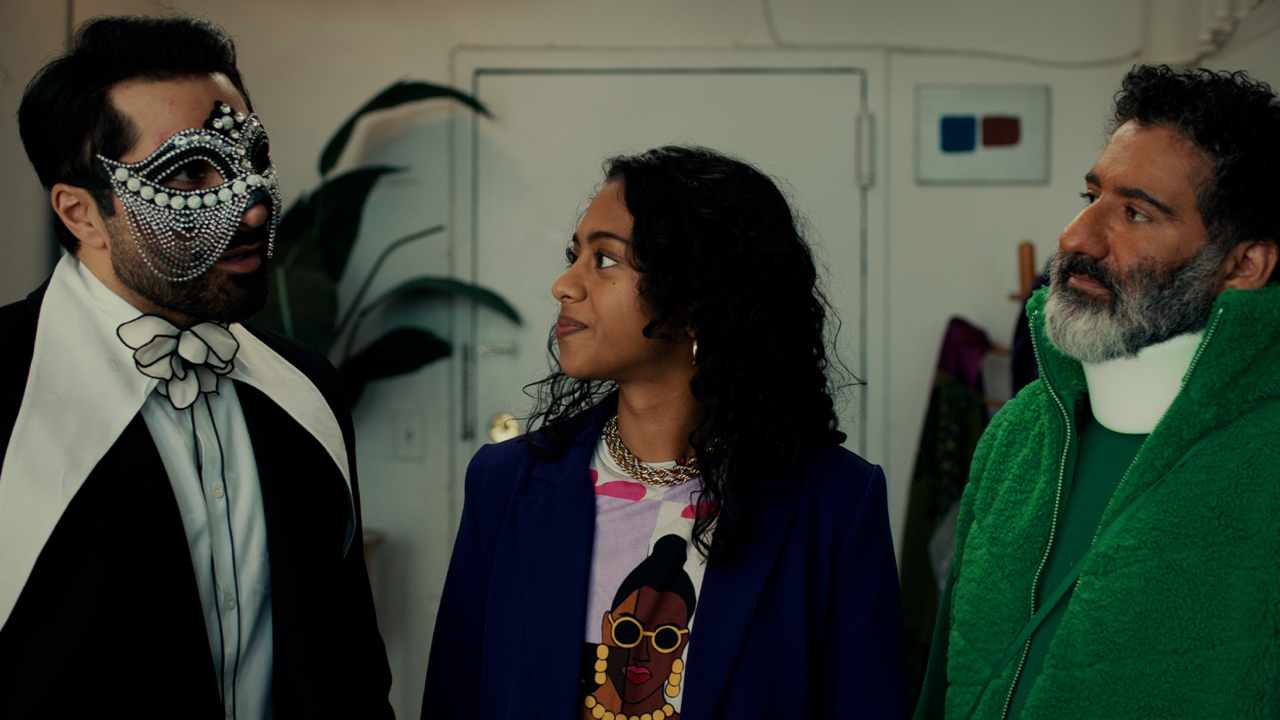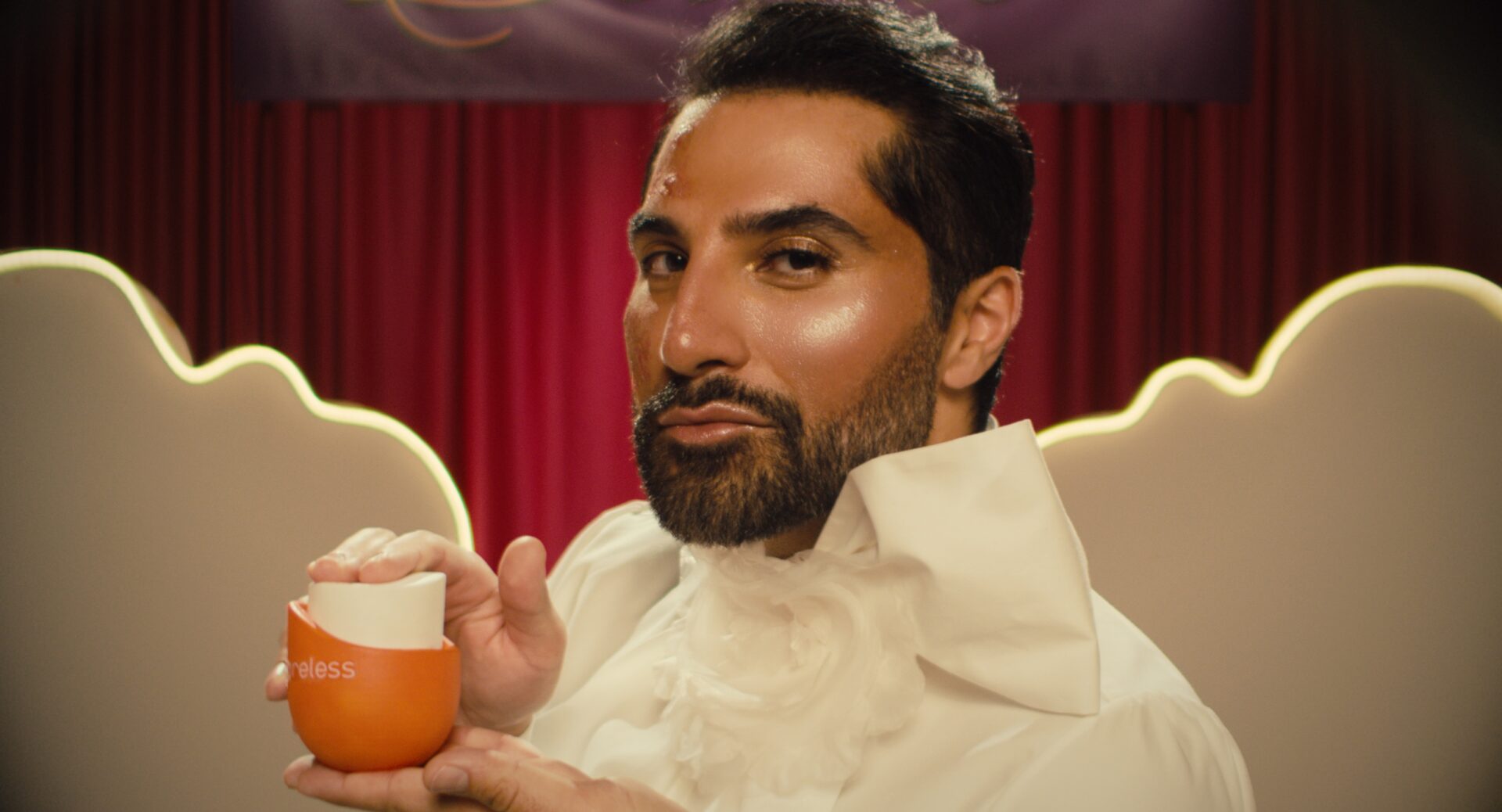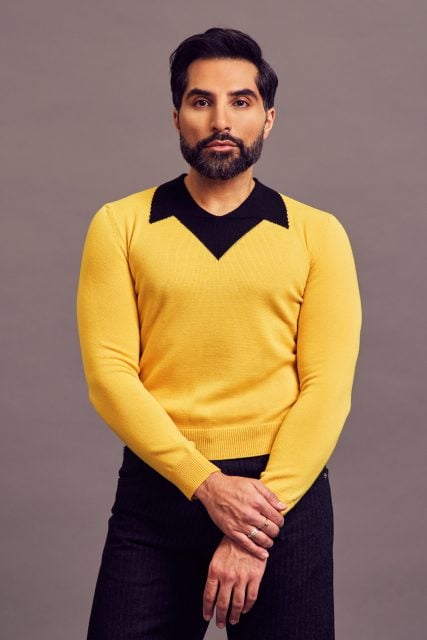Akbar Hamid is making a powerful entrance onto the film festival circuit with “PORELESS,” a poignant and comedic short film set to premiere at the Tribeca Festival on June 7. More than just a lead actor, Hamid also steps into his first co-producing role for the project, which he describes as deeply personal and a testament to the power of authentic storytelling. “The film, directed by Harris Doran and co-written with Fawzia Mirza, promises to resonate deeply, particularly within the LGBTQ+ and AAPI communities as it unpacks themes of queerness, beauty standards, and cultural identity. Doran even directed on the project as well.
“Storytelling has always been part of my life,” Hamid told Gayety, reflecting on his journey to “PORELESS.” He recounted a childhood in Karachi, Pakistan, filled with homemade movies and pretend talk shows, a creative outlet that was later stifled by a more conservative environment. His passion for narrative eventually found a new avenue in brand building with his agency, The 5th Column, which celebrates its 10th anniversary this year. However, the urge to act and tell stories on screen remained.

A pivotal moment came with his meeting Fawzia Mirza, a highly acclaimed storyteller and director. “We met just as her debut feature, Queen of My Dreams (about to have US Theatrical release June 20th!!), was premiering at TIFF, and we connected not only as creatives but as queer South Asian Muslims with shared experiences,” Hamid shared. Mirza encouraged him to pursue his “delulu dreams” of acting, introducing him to Harris Doran, a Juilliard-trained talent behind films like Kokomo City. Doran became both his acting coach and co-producer on “PORELESS.”
“Over the past two-plus years, I’ve worked hard on my craft,” Hamid stated, explaining how Mirza and Doran crafted a story “loosely inspired by my journey, a story about reclaiming your identity, being your most authentic self, and doing it all fabulously.” Taking on both acting and co-producing roles was a deliberate choice for Hamid, who is also the founder of The 5th Column, a gaming startup, and the host of the new podcast, “The SafeTea.” “Because one role is never enough for me,” he joked, “I wanted to dive deep into every part of the process, from fundraising to location scouting to crisis-solving on set. It became a true crash course in acting and filmmaking, and I’m forever grateful to the entire cast and crew, every single person was essential to the experience and my growth.”
“PORELESS” centers on Akram, a queer Muslim beauty entrepreneur, whose pitch for a lifetime opportunity is jeopardized by a nut-induced facial meltdown. With the “help—and hindrance—from his gay Muslim siblings,” Akram confronts not only his allergies but also deeper wounds related to self-worth, representation, and internalized beauty myths.
Hamid revealed the profound connection between Akram’s story and his own. “Akram’s experience is deeply tied to my own. His struggle with identity, being gay, Muslim, brown, South Asian, yet also American and a first-generation son of immigrants, mirrors so much of what I’ve wrestled with,” he shared. Playing the character proved to be a “truly healing and transformative” experience. “As someone who spent years rejecting parts of myself, feeling like my Muslim and South Asian identities had rejected me, it was beautiful to reclaim them through this character. It’s a reminder that you don’t have to choose, you can be all those things at once. And honestly, who makes the rules? Being gay, Muslim, South Asian is absolutely f*ing fabulous.”
The film also delves into the often-overlooked internal struggles within the LGBTQ+ community regarding beauty standards. “The film explores the layers of queerness and beauty standards not just in the world or the beauty industry, but within the LGBTQ+ community itself, which can be incredibly ostracizing,” Hamid explained. He touched on the pressure to conform, even within queer spaces, and the “constant striving for perfection: to fit in, to be desired, to be loved.” He candidly admitted, “As queer people, many of us have faced rejection all our lives, so we often chase validation and belonging, and sometimes that spirals into an unhealthy, endless pursuit. That’s been very real in my own journey; it took me a long time to find true belonging within my queer community. This film gave me the chance to revisit those painful moments, rewrite old narratives, and in many ways, finally reclaim myself.”
Hamid hopes “PORELESS” offers a powerful message, especially for queer and Muslim viewers. “We are all searching for self-worth, validation, love, but so often we look everywhere except within ourselves,” he observed. “What I hope people take away, especially queer and Muslim viewers, is that you are worthy. You always have been. You don’t need to look outward to know your worth; it’s within you. The most important acceptance, the most powerful validation, the most unshakeable relationship is the one you have with yourself.” He stressed the importance of self-love as a foundation for all other connections, adding, “Until we love and accept ourselves fully, no external love will ever feel like enough.”
The collaborative process behind “PORELESS” was marked by creativity and trust. “We had SO much fun! Harris and Fawzia are pure creative geniuses, and they had me laughing from the moment they handed me the script,” Hamid said. He noted the rigorous nature of filmmaking, where even beloved moments can be cut for the sake of the story. “It was a huge learning experience for me, learning to trust their vision completely and then seeing in the final cut, oh wow, they were right. Every snip, every adjustment made the film tighter, funnier, sharper.”

Hamid specifically highlighted a “Mean Girls”-esque hallway walk scene involving beauty executives as a suggestion he made that Harris Doran ran with, adding to the film’s “fun and campy” tone. He proudly mentioned that Bill Kirstein, the cinematographer from the “Mean Girls” remake, shot “PORELESS,” calling it “wow!” He also praised the “incredibly talented actors” Lucy Owen, Sophie von Haselberg, Gia Crovatin, and Allyce Beasley for their performances.
The film’s authenticity stems from its diverse creative team. “The reason the story feels so authentic and layered is because we had such a strong collaborative vision. Fawzia brought South Asian, queer Muslim authenticity; Harris brought the queer male perspective; and together, they infused it all with their signature humor and genius,” Hamid explained. “We were constantly punching up, punching down, and fine-tuning moments to truly capture the queer South Asian and Muslim experience on screen.”
Bringing “PORELESS” to the Tribeca stage is a momentous occasion for Hamid. “I honestly can’t believe I’m even doing this interview for the Tribeca premiere of Poreless. It’s such a pinch-me moment, not just for me as a first-time filmmaker and actor, but for the queer, queer Muslim, and South Asian communities at large. This isn’t just my moment; it’s a moment for all of us,” he stated passionately. “It’s a powerful reminder that our stories matter, that they’re not just niche, they’re human stories everyone can connect to. Believe it or not, other communities are interested in us! We’re not just here watching ourselves; we’re part of the global conversation, and our stories deserve to stand front and center alongside everyone else’s.”
Receiving the news of Tribeca’s acceptance was overwhelming. “When Harris and Fawzia called to tell me we got into Tribeca, it was one of the absolute highlights of my life. I was in shock, I cried, I laughed, I screamed,” Hamid recounted. “And mostly, I felt this deep joy, thinking about that little kid inside me who had been ostracized for so long. What would he say if he knew that one day, his story, or a version of it, would be shared on one of the biggest global stages, so that no one else has to feel that alone?”
Beyond identity, “PORELESS” also explores universal themes of family and support. “This is a story about family, about showing up for each other. The love Akram’s siblings, Asma and Arif, have for him is so pure and beautiful. It shows how crucial family support is, even when navigating all the complexities and tensions that come with it. That, too, is something I hope resonates far beyond any single community.” Hamid extended his gratitude to Ben Thompson, Vice President of Shorts Programming at Tribeca Festival, and his team for “giving us the opportunity of a lifetime to share Poreless with the world.”
As a queer Muslim immigrant from Pakistan, Hamid acknowledges the pressure to represent certain facets of his identity. “Absolutely, there’s always pressure, both internal and external, to amplify certain parts of my identity more than others,” he admitted. “Sometimes the world wants you to be ‘queer enough,’ ‘Muslim enough,’ or ‘immigrant enough,’ depending on the audience. And at the same time, you’re not American enough, not white enough, but also not brown enough or queer enough within your own communities. It creates this constant tension, this deep feeling of not knowing exactly where you sit or who you are.” He revealed moments of feeling “ashamed” of his Muslim or Pakistani identity due to societal perceptions. “But over time, I’ve realized I can’t be reduced to one label, nor do I want to perform or erase parts of myself just to make others comfortable. My work is about embracing that messy, layered intersection, showing that we can hold multiple truths at once and that none of us should have to shrink, split, or silence ourselves to fit expectations.”
On navigating vulnerability and maintaining ownership of his narrative, Hamid emphasized intentionality. “Vulnerability doesn’t mean giving everything away,” he said. “I’ve learned that maintaining ownership over my narrative means being intentional: sharing the parts of my story that serve a purpose, that connect, that heal, but keeping space for myself, too. For me, sharing vulnerability has to come with purpose, I share to heal, to uplift, to inspire, and to help others feel less alone.” He highlighted his new podcast, “The SafeTea,” as a platform for these unfiltered conversations. “Vulnerability can be powerful, but only when you’re the one setting the terms, and for me, the most important thing is telling my story on my own terms, not just for others’ consumption.”

Hamid’s background in luxury branding has significantly influenced his filmmaking. “I have a deep understanding of what audiences want to see,” he stated, attributing this to both his lived experience and his work with The 5th Column. “In luxury branding, you learn how to craft desire, how to create narratives that feel authentic, aspirational, and emotionally charged. That translates directly into film: knowing how to shape a story that pulls people in, that makes them feel seen, that leaves an impact.” He also noted the practical advantages, explaining his “producer’s mindset” in marketing and positioning a film, securing sponsorships and partnerships. “In today’s landscape, that strategic, brand-driven approach is essential to getting indie films seen and celebrated. And in my opinion brand partnerships like this are going to be a big part of the future funding and filmmaking process for indies.”
The 10th anniversary of The 5th Column this year coincides with the debut of “PORELESS,” which Hamid sees as a reflection of his evolution. “Over the past two decades, I’ve helped brands navigate identity, authenticity, and cultural relevance, but this film let me apply that same lens to my own story. It’s where my personal evolution and professional skill set collided.” He firmly believes in living a multidimensional life. “Honestly who says you can’t do it all? Why can’t you own a marketing and brand-building agency, run a production company, act, and host a podcast? For me, all of it feeds together; it’s a symbiotic ecosystem where creativity sparks more creativity. Every path I pursue strengthens the others, and I believe we’re allowed to live multidimensional, expansive lives. Poreless is both deeply personal and highly intentional, a project that draws on everything I’ve learned about storytelling, community, and the power of representation.”
For queer creatives, especially those from marginalized backgrounds, Hamid offers a powerful message: “Stop waiting for permission, no one’s going to hand it to you. Your story matters right now, exactly as you are.” He asserts, “We are already enough, and our voices are powerful because they break through spaces that were never built for us. Tell your story on your own terms, the world needs it, and you don’t need anyone’s approval to take up that space.” He hopes “PORELESS” serves as an example that “anything is possible.” “I had a vision and a dream, and I made it real through sheer determination, hard work, and refusing to take no for an answer.”
With “PORELESS” premiering between AAPI Heritage Month and Pride Month, Hamid finds profound significance in the timing. “This moment feels incredibly full-circle… It’s a chance to reflect on how far I’ve come, not just as a queer, South Asian, Muslim creative, but as someone who’s spent years helping others tell their stories and now finally telling my own. It’s emotional honestly, I’m celebrating the richness of these identities, the resilience it’s taken to get here, and the responsibility I feel to use this platform to uplift others.”
This year, Pride holds a particularly personal meaning for Hamid. “With Poreless out in the world, I feel a new sense of visibility — not just as a queer person, but as a storyteller owning my narrative on my own terms. My relationship to the community has also deepened; I’m more aware than ever of how vital it is to lift each other up, create space, and ensure no one is left behind. Pride, to me, isn’t just about celebration; it’s about responsibility, using whatever platform or privilege I have to amplify others, push for representation, and remind us all that we are worthy, seen, and enough. I also feel a deep sense of pride in reclaiming all my identities, Pakistani, queer, Muslim, and it feels incredibly powerful to stand in my full authenticity and celebrate every part of who I am.”
Regarding the evolution of queer cinema, Hamid believes “queer cinema still has a long way to go.” While acknowledging the importance of trauma and coming-out narratives, he asserts, “They can’t be the only ones we tell. What makes Poreless feel both timely and timeless is that it leans into the absurdity, the humor, the messiness of identity; it’s not just about pain, it’s about joy, ambition, and reinvention. Queer cinema needs more space for that kind of richness, and I’m excited to help push that forward.”
Looking ahead, Hamid plans to continue “All of it!” – acting, producing, and cultural strategy. He revealed he recently completed an acting masterclass with Bob Krakower and is currently auditioning for features while developing his own projects. He also looks forward to expanding his podcast, “The SafeTea.”
His ultimate dream project? “A Monsoon Wedding 2 or a spin-off inspired by Varun, the unofficially gay younger brother, and his big, fabulous gay South Asian wedding.” He envisions a “Moulin Rouge-esque, Baz Luhrmann-style spectacle bursting with color, music, drama, joy, and theatricality.” He sees it as “a big fat gay South Asian wedding on screen would be such a celebration, not just of love, but of cultural reinvention and queer joy. It’s like ‘Bombay Dreams’ the musical meets Mamma Mia the movie. Ok, one can dream!”
Hamid succinctly described “PORELESS” in three words: “Joyful. Fearless. Healing.” The film is set to debut at the Tribeca Festival on June 7, a pivotal moment for Akbar Hamid and for the continued expansion of authentic, intersectional queer narratives in cinema.

